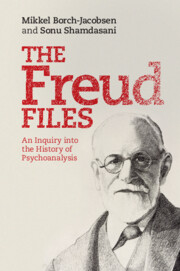2 - The interprefaction of dreams
Published online by Cambridge University Press: 05 June 2012
Summary
The ‘history of psychoanalysis’ which Freud and his followers recounted is by no means a history as generally understood. Rather it is an edifying fable, a scientific ‘family romance’, designed to negate the humble historical origins of psychoanalysis. How else can one understand why Freud devised such a mythic account, which could so easily be factually contradicted? Moreover, it is obvious that Freud would have been aware that many of his contemporaries would not have taken seriously his pretensions of originality. This was precisely what critics such as Hoche, Aschaffenburg, Forel and others stressed.
Hoche: How is such a [psychoanalytic] movement possible? Without doubt a negative presupposition is the lack of a historical sense and philosophical training on the part of the followers able to be fanatical for the theory.
Aschaffenburg: When Freud strongly overestimates himself and the significance of his theory, and with sharp words presents the psychiatrists from whom he has much to learn, even concerning elementary knowledge, as incapable, then one must regard him as having been spoilt by the blind admiration of his disciples.
Forel: It does not occur to me to deny the great service of Freud and his particular school. Yet I must make two objections to him; first, that he ignores the works of his predecessors in a methodical manner, and second, that he presents all sorts of hypothetical things as facts . . . According to Hitschmann’s book, [Freud’s Theory of Neuroses] one would believe that Freud discovered the unconscious! We need only refer to the numerous works of modern psychology, as well as to Dessoir’s more strictly defined concept of the ‘underconscious’ [Unterbewussten] . . . to show how incorrect such a view is . . . Freud would like to revolutionise the entire domain of psychology and psychopathology. As we have seen, he ignores his predecessors and those who do not agree with him with a sovereign silence.
Vogt, International Congress of Medical Psychology and Psychotherapy, 7–8 August 1910: I object that a man like myself who has collected his own dreams since the age of sixteen and has investigated the problems under discussion here since 1894, that is, almost as long as Freud has done and longer than any of his disciples, should be refused the right to discuss these questions by any Freudian!
Morton Prince: But in the pursuit of these [psychoanalytic] researches there has been too great a disregard of large numbers of facts, of psychopathological data which have been accumulated by the patient investigations of other observers. It is much as if a bacteriologist had confined his studies to the investigation of a single bacillus and had neglected the great storehouse of knowledge acquired in the whole bacteriological field.
Victor Haberman: Now why should Kraepelin, Ziehen, Hoche, Isserlin, Aschaffenburg, etc., men trained in psychology and psychiatry, men whose studies in association-psychology and in psychopathology (to say nothing of their neurological work) are familiar to every student in these fields, some of whose studies have become ‘classical’ and the fundamentals for subsequent work – why should these painstaking investigators be ‘ignorant of’ and ‘have no feel for the subject’? Why should they be ‘incompetent and unable to judge’? Why should it be that ‘they have not mastered the theory,’ these real masters of psychology and psychopathology! That they should not be able to comprehend and apprehend what these remarkable members of the Psychoanalytic Society have mastered with ease – some of them writing ex cathedra on the subject directly they were weaned to it – these wondrous wielders of the Deep Psychology, with their vast experience (whence derived?) and their profound learning in soul-analysis (whence acquired – all from the reading of Freudian literature?).
Wohlgemuth: Almost complete ignorance is manifested everywhere [in Freud] of the literature and the results of modern psychology, of experimental method and of logic.
In addition, most of the protagonists of Freud’s accounts were still living (notably Breuer and Bertha Pappenheim), and hence there was the risk that they might publicly contradict him. How are we to understand, then, this rescripting of history?
- Type
- Chapter
- Information
- The Freud FilesAn Inquiry into the History of Psychoanalysis, pp. 116 - 178Publisher: Cambridge University PressPrint publication year: 2011



